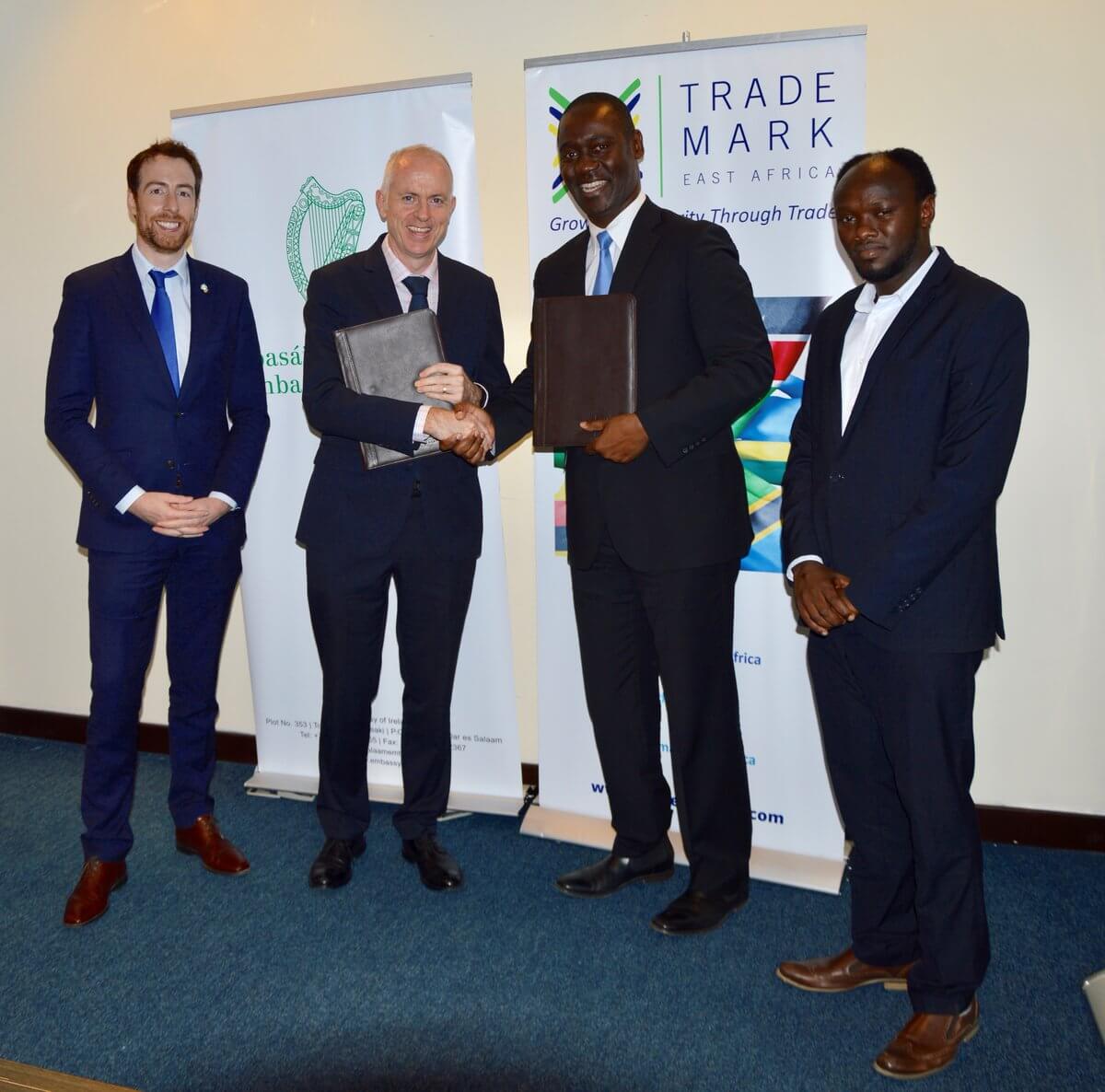Dar es salaam, Tanzania -17th December 2018 – Ireland launched a new partnership worth €1 million (Tsh 2.6 billion) with TradeMark Africa (TMA) to facilitate increased trade for Tanzania. TradeMark Africa’s work in Tanzania centres on strengthening the environment for trade and business, with a focus on increased physical access to markets; building an enhanced regulatory environment for trade; and promoting improved business competitiveness. This will be Ireland’s first grant to TradeMark Africa (TMA) and it is expected that further support will be provided over the coming three years. The Embassy of Ireland’s grant to TradeMark Africa complements its investment, announced in September, of an additional €2.76 million (Tsh 7.32 trillion) to improve income opportunities within Tanzania’s agriculture sector.
The partnership was launched by Ambassador Paul Sherlock and John Ulanga, Country Director, TradeMark Africa (TMA) Tanzania at TMA’s offices in Dar Es Salaam. Speaking at the launch, Ambassador Sherlock, underlined the importance of trade for sustainable economic growth:
“Over the past 50 years, Ireland has evolved from being a relatively closed economy to one of the most open economies in the world. This experience has transformed our country beyond recognition. As a small open economy, trade and investment have become fundamental to achieving sustainable growth in Ireland and quality jobs for all our citizens.”
Increased trade is a powerful means by which to stimulate economic growth and job creation in Tanzania and it will need to be a central priority if Tanzania is to achieve its target of becoming a middle-income country by 2025.”
Ambassador Sherlock also emphasised the importance of TradeMark Africa’s work over the coming six months in supporting the operationalisation of the Tanzania Mercantile Exchange and on its specific programming which supports increased inclusion of women in cross-border trade.
“I am very happy that this grant will support TradeMark Africa (TMA) in its efforts to operationalisation the Tanzania Mercantile (Commodities) Exchange which will revolutionise trading of agriculture produce from Tanzania. This support will include installing trading information system, warehousing and market information dissemination systems.”
“Through all our work, the Embassy places a strong focus on gender equality to ensure that women are enabled to maximise their contribution to and benefit from improved economic growth. This is why, I am very pleased that Ireland’s grant enable TradeMark to increase its Women and Trade Programme in collaboration with the Tanzania Women Chamber of Commerce. This programme builds the capacity of women traders in Tanzania, including supporting them to mobilise resources to establish industrial parks for women food processers, and be able to access markets outside Tanzania.”
In his remarks, Ambassador Sherlock also highlighted the Embassy’s broader work in support of Tanzania’s trade. This includes a capacity building programme Tanzania Port Authority through the UN’s Port Training Programme which promotes the sharing of knowledge and expertise between port operators in Dublin and Dar Es Salaam. Ambassador Sherlock also spoke about the Africa Agri-Food Development Fund designed to support sustainable growth of the agri-food industry in Africa, build markets for African exports and support mutual tradebetween Ireland and Africa. He expressed his hope that this Fund will be accessed by Tanzanian firms to establish business links with Ireland and increase trade and investment in this sector. Lastly, the Ambassador expressed his satisfaction that the Embassy was able to support some of Tanzania’s leading entrepreneurs to attend the Africa-Ireland Economic Forum which took place in Dublin last month. This annual event creates opportunities for business leaders from Ireland and those across Africa to meet and explore how trade and investment across Africa can be increased.
TradeMark Africa is making a huge difference to reducing the high barriers to trade in East Africa. Since starting its operations in Tanzania in the year 2011, TradeMark Africa (TMA) has supported partners such as Tanzania Ports Authority, Tanzania Revenue Authority, Tanzania Food and Drugs Authority and Tanzania Bureau of Standards to improve their capacity and efficiency in facilitating trade. After the work done by TradeMark Africa (TMA) and its partners to reduce infrastructure barriers, border delays and reducing red tape, we have witnessed an increase in efficiency by at least 50 percent. In an era of doubts about the value for money of aid, TradeMark Africa (TMA) stands out as a programme that has delivered real impact for real businesses and people. TradeMark Africa (TMA) has made this happen by focusing on addressing bottlenecks and automating trade processes.
TMA which is embarking on its new strategy covering the period 2017-2023. Strategy 2 offers large-scale transformative impact, building on gains made to date but recognising the substantial potential gains that can still be made. This Strategy will contribute to an impact of US$0.6 billion of additional trade in East Africa. This will, in turn, contribute to sustainable, inclusive prosperity by adding US$4.7 billion to the region’s GDP, creating and sustaining more than 0.7 million additional jobs, lifting more than 1.8 million people out of poverty, generating an additional U$1.1 billion of tax revenue, and creating over US$0.64 billion of additional economic welfare gains for the region.
TradeMark Tanzania Country Director John Ulanga added the support to TradeMark Africa (TMA) Tanzania is expected to improve its trade competitiveness and increase its profile as an investment destination within the East African Community.
“The Irish government is an important partner in promoting regional and economic integration in East Africa. TradeMark Africa will continue to focus its efforts on increasing trade and prosperity in East Africa, primarily through investing where there will be the biggest impact for East Africa’s people and the private sector. Facilitating regional trade is an effective means to alleviate poverty. This investment in supporting these projects is the catalyst needed to bring prosperity to the region, and Tanzania specifically” said John Ulanga.















